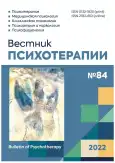Neurotic disorders: a comparative analysis of the International Statistical Classification of Diseases and Related Health Problems 10th vs 11th revision
- Authors: Tsupko A.R.1, Ababkov V.A.1, Isurina G.L.1
-
Affiliations:
- Saint Petersburg State University
- Issue: No 84 (2022)
- Pages: 100-107
- Section: Psychiatry
- URL: https://journal-vniispk.ru/0132-182X/article/view/310579
- DOI: https://doi.org/10.25016/2782-652X-2022-0-84-100-107
- ID: 310579
Cite item
Full Text
Abstract
Relevance. On 01.01.2023, the 11th revision of International Statistical Classification of Diseases and Health-related Problems (ICD-11) will be introduced worldwide. Intention. To conduct a comparative analysis of the changes made to the eleventh revision of the International Statistical Classification of Diseases and Health–Related Problems (ICD-11), which are associated with the concept of «neurotic disorders». Methodology. A descriptive methodological analysis of two editions of the International Statistical Classification of Diseases and Health–Related Problems – 10 (ICD-10) and 11 (ICD-11) was used. Results and Discussion. The concept of «neurotic disorder» leaves the ICD-11 and a monothematic approach to the diagnosis of diseases comes to the fore, which unites disorders into homogeneous groups in essence. Neurotic disorders in their more traditional sense have not disappeared, and the new version of the ICD reflects new scientific achievements necessary for specific purposes of the health system. Conclusion. The results of the analysis demonstrate how the classification of neurotic disorders is organized now, in the new version of ICD-11. The article is intended primarily for doctors and clinical psychologists.
About the authors
A. R. Tsupko
Saint Petersburg State University
Author for correspondence.
Email: J2G@inbox.ru
7–9, Universitetskaya embank, St. Petersburg, 199034
V. A. Ababkov
Saint Petersburg State University
Email: J2G@inbox.ru
7–9, Universitetskaya embank, St. Petersburg, 199034
G. L. Isurina
Saint Petersburg State University
Email: J2G@inbox.ru
7–9, Universitetskaya embank, St. Petersburg, 199034
References
- Ababkov V.A., Isurina G.L, Mizinova E.B. Uchenie o nevrozakh [The doctrine of neuroses]. St. Petersburg. 2012. 175 p. (In Russ.)
- Berezin F.B. Psikhicheskaya i psikhofiziologicheskaya adaptatsiya cheloveka [Mental and psychophysiological adaptation of a person]. Leningrad. 1988. 267 p. (In Russ.)
- Karvasarskii B.D. Nevrozy [Neuroses]. Moscow. 1990. 576 p. (In Russ.)
- Mendelevich V.D., Solov’eva S.L. Nevrozologiya i psikhosomaticheskaya meditsina [Neurosology and psychosomatic medicine]. Moscow. 2020. 595 p. (In Russ.)
- Mezhdunarodnaya klassifikatsiya boleznei (10-i peresmotr). Klassifikatsiya psikhicheskikh i povedencheskikh rasstroistv: MKB-10 [5. International Classification of Diseases (10th revision). Classification of mental and behavioral disorders: ICD-10]. St. Petersburg. 1994. 303 p. (In Russ.)
- MKB-11. Glava 06. Psikhicheskie i povedencheskie rasstroistva i narusheniya neiropsikhicheskogo razvitiya. Statisticheskaya klassifikatsiya [ICD-11. Chapter 06. Mental and behavioral disorders and disorders of neuropsychic development. Statistical classification]. Ed. G.P. Kostyuk. Moscow. 2021. 432 p. (In Russ.)
- Psikhiatriya: natsional’noe rukovodstvo [Psychiatry: national leadership]. Eds.:. Yu.A. Aleksandrovskii, N.G. Neznanov. Moscow. 2020. 108 p. (In Russ.)
- Paris J. The intelligent clinician’s guide to the DSM-5. New Jork: Oxford University Press. 2013. 232 p.
- Reed G.M., First M.B., Kogan C.S. [et al.]. Innovations and changes in the ICD-11 classification of mental, behavioural and neurodevelopmental disorders. World Psychiatry. 2019; 18(1):3–19. doi: 10.1002/wps.20611.
- Stein D.J., Kogan C.S., Atmaca M. [et al.]. The classification of obsessive- compulsive and related disorders in the ICD-11. J. Affect. Disord. 2016; 190:663–674.
- World Health Organization. ICD-11 for mortality and morbidity statistics (ICD-11 MMS) 2018 version. URL: https://icd.who.int/browse11/l-m/en.
Supplementary files










